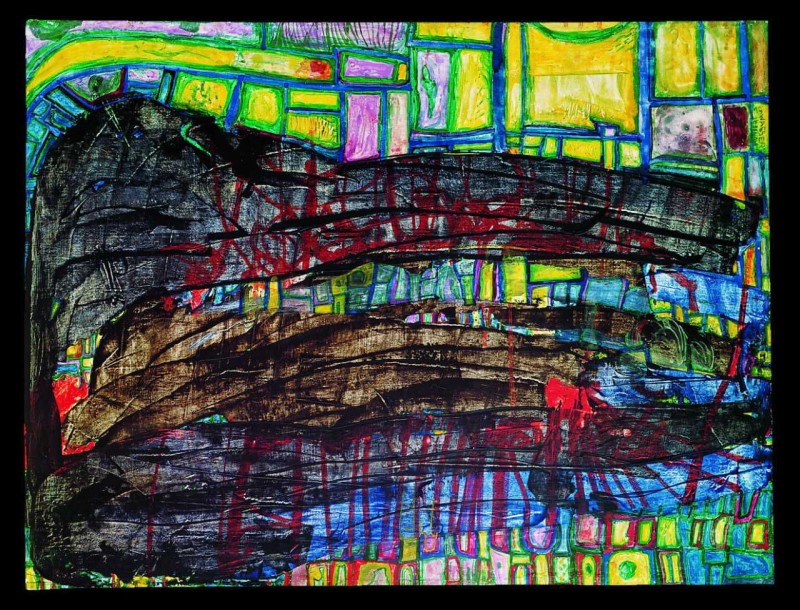312
UTILISATION ECONOMIQUE DE L'ESPACE MEME TOUT PETIT
DIE WIRTSCHAFTLICHE VERWENDUNG EINER SELBST NOCH SO KLEINEN FLÄCHE
ECONOMICAL USE OF EVEN THE SMALLEST SUPERFICIES
1957
Painted in St. Mandé/Seine, July 1957
480 mm x 630 mm
Mixed media: watercolour, chrysochrome and egg tempera on paper, primed with chalk, zinc white and fish glue; mounted on canvas
- 31st Venice Biennial, 1962
- Osthaus Museum Hagen, Hagen, 2015
- *
- World Travelling Museum Exhibition:
- The Tel Aviv Museum, 1976
- Art & Antique, Hofburg, Vienna, 2013
- A. C. Fürst, Hundertwasser 1928-2000, Catalogue Raisonné, Cologne, 2002, Vol. II, pp. 336-338 (and c)
- XXXI. Biennale di Venezia, Austria, 1962, cat. 23
- Kestner-Gesellschaft, Hanover, 1964, p. 157
- National Gallery of Iceland, Reykjavik, 1976, p. 169 (c)
- Supplementary edition, Reykjavik, 1976, p. 35
- Neuheiten im Frühling 2014, Galerie Zetter, Vienna, 2014, 44f. (c)
- Hundertwasser Lebenslinien, Osthaus Museum, Hagen, 2015, p. 24 (c)

Hundertwasser's comment on the work
I had a multi-faceted strategy for living and painting in Paris with no money.
1. I had fourteen friends and families I knew who invited me to a noon or evening meal once a week. I could also stretch it to once a fortnight; this way I was not a burden to anyone, and I was consistent about never becoming one.
2. I never took food from dustbins, but I did material: packing paper, plywood panels and cloth remnants, which I turned into clothes, shoes and a sleeping bag.
3. If I went to one of the open-air markets in Paris at the stroke of noon, everything that was not sold and was in danger of spoiling was thrown onto the street. The trick to this was to quickly gather up this food - fruit for the most part - before the unfriendly street sweepers smacked your fingers with their brooms.
4. From Brô I learned to live on wheat. With one kilogramme of wheat from a farmer or cheaply purchased as chicken feed or seed, I could live a week. With it I could make: wheat soup, bread, wheat cakes, wheat coffee and wheat-germ salad. Wheat was subject to state monopoly, like tobacco. To keep people from trying to live off wheat for only one mark per month (or about that), wheat for livestock was dyed red or blue. Once I rode my bicycle to the nearest farmer, out beyond St. Maur, and got five kilogrammes of wheat for digging potatoes all day, and that was enough for several months.
5. I only rarely went to charity meals, for example in the Palais Royal, put on by ladies who took an interest in artists.
6. I stood in front of the Parisian cafés, Les Deux Magots, for example, until somebody who knew me invited me to sit down at their table. Afterwards I asked for twenty centimes (ten pfennigs), say, never for more, which was willingly given me. Since I did not spend any money, after a while I had more and more money in spite of everything.
7. When I visited someone, I also asked for a little salt, sugar or oil, never more than would fill an empty film case, which surprised people, but was always willingly given.
8. Discarded hard french bread, when soaked in water and then roasted, was like fresh bread.
9. I borrowed a bicycle from the Dumage family (the Metro was too expensive) and lived in an unused storeroom in an unused garage.
10. I never resorted to sensational steps such as the one Kiki Kogelnik told me about: Arnulf Rainer took Kiki to dinner at a posh restaurant on the Champs Elysées and said, "I'll take the right side, you take the left". They ran from table to table, stuffing themselves with the leftovers still on the plates before the waiters cleared the table. Before the latter could react, the two were outside again.
With these feasible survival strategies I wanted to live my life and was actually very upset and not at all happy that somebody wanted to buy a picture. When I refused several times - I wanted to extend this happy and self-sufficient state, which went on for about ten years - I got the reputation of being a shrewd businessman. And at that I only wanted to prove that you can live without money, if only because of my mother, who always said, "Painting is a profession for starvelings". When I had my first contract with Kamer, I wrote in the exhibition catalogue of St. Stephen's Gallery, "Painting is not a profession for starvelings, for one can get rich quickly doing it. With the money I earned in France with my painting I bought a house and a car for myself." After proving this, money was no longer of interest to me, just as before, except as a sign of appreciation of my endeavours, later for acquiring plots in nature to save them and for supporting architectural projects when the budget had been exceeded. (see also the Nettle Manifestation, vol. 1, pp. 84-86) (from: Hundertwasser 1928-2000, Catalogue Raisonné, Vol. 2, Taschen, Cologne, 2002, pp. 337-338)